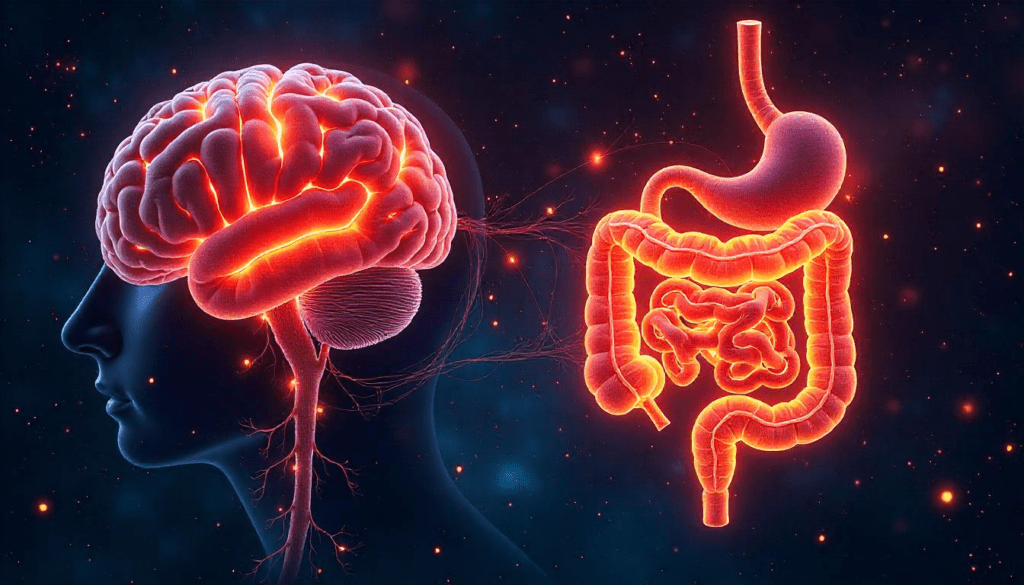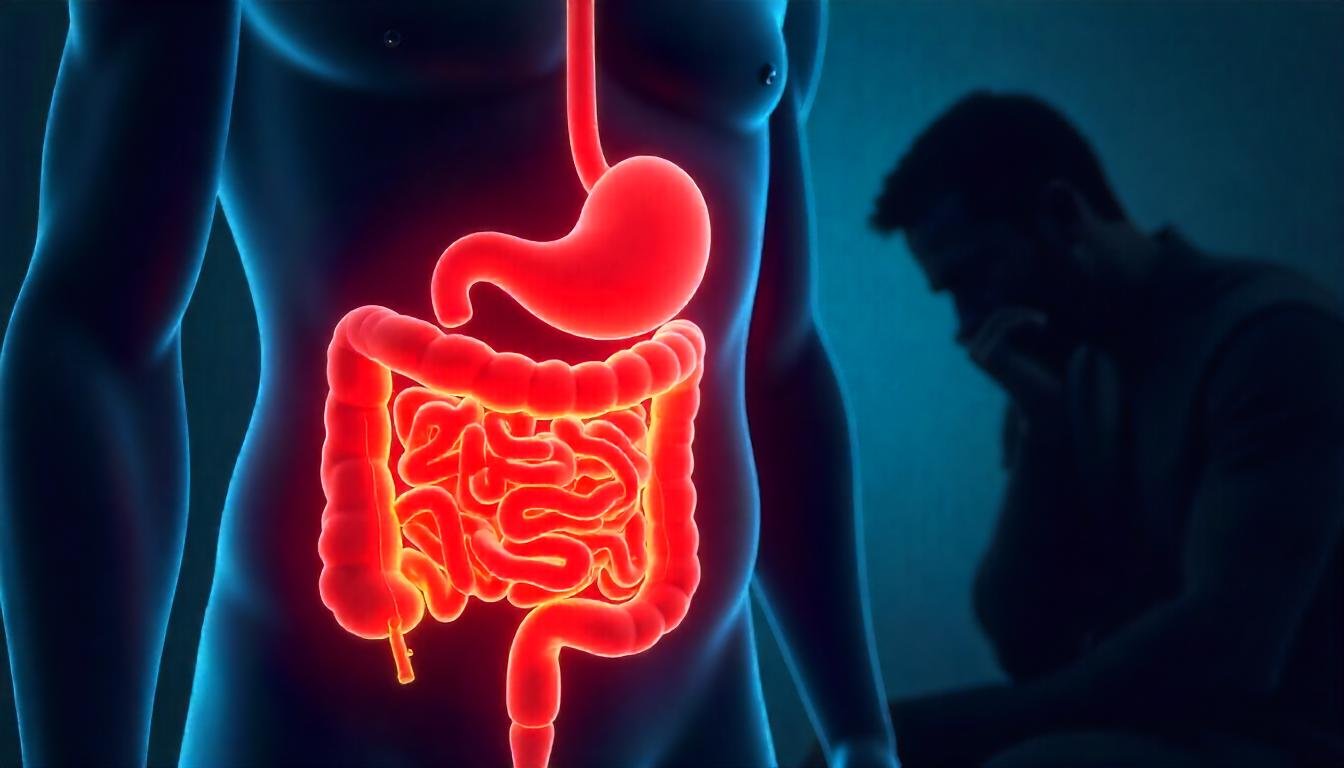Have you ever felt your stomach twist into knots before a big presentation? Or found yourself running to the restroom when life feels overwhelming? You’re not alone. The gut and brain share an intimate connection that scientists are only beginning to fully understand. For many of us, our emotional struggles show up physically, often in the form of digestive issues, that is known the link between stress and digestion.
I know this firsthand. A few years ago, I went through one of the most stressful periods of my life—moving cities, changing jobs, and dealing with a personal loss. During that time, I developed unexplained stomach pain, bloating, and sudden food intolerances. Doctors could find nothing structurally wrong, but the symptoms were real. What I learned through this experience not only healed my gut but also taught me to manage stress in more mindful ways.
In this guide, I will walk you through the science behind the gut-brain connection, common digestive issues caused by stress, and natural remedies that helped me—and can help you too.
Table of Contents
Understanding the Gut-Brain Axis

The gut-brain axis is the communication highway between your brain and your digestive system. Think of it like a two-way street. Your brain sends signals to your gut, and your gut sends signals back to your brain.
When you’re under stress, your body shifts into “fight or flight” mode. This releases hormones like cortisol and adrenaline, which help you deal with danger—but they also put digestion on the back burner. Blood flow is redirected away from your gut, enzymes aren’t released as efficiently, and motility slows down or speeds up erratically.
This explains why:
- Some people get constipated when stressed
- Others experience diarrhea or cramping
- Appetite can vanish or go into overdrive
Scientific studies have shown that chronic stress can even alter your gut microbiota—the community of bacteria that help digest food and regulate immune response. When your microbiome is out of balance (a condition called dysbiosis), it can trigger bloating, gas, inflammation, and even anxiety.
Stress-Related Digestive Disorders

Let’s break down the most common digestive issues that are closely linked with stress.
1. Irritable Bowel Syndrome (IBS)
IBS is one of the clearest examples of how stress affects digestion. Symptoms include:
- Bloating
- Abdominal pain
- Diarrhea or constipation (or both)
IBS has no clear physical cause and is often diagnosed by exclusion. Many patients, like myself, find that symptoms flare during stressful events. Learning stress management techniques is often more effective than medication.
2. Acid Reflux and GERD
Have you noticed heartburn during particularly tense times? That’s no coincidence. Stress can:
- Increase stomach acid production
- Weaken the lower esophageal sphincter (which prevents acid from rising)
This combination leads to acid reflux, and over time, GERD (Gastroesophageal Reflux Disease).
3. Functional Dyspepsia
This is a fancy term for upper abdominal discomfort, often described as:
- Fullness
- Nausea
- Mild pain
Though it feels like something is wrong, medical tests usually come back normal. Stress can delay stomach emptying, causing that heavy, bloated sensation.
4. Changes in Bowel Habits
Some people swing between constipation and diarrhea depending on their stress levels. This is often tied to gut motility changes influenced by your nervous system.
5. Food Intolerances
During my most stressful months, I developed a sensitivity to dairy and gluten that I never had before. Stress can cause intestinal permeability (leaky gut), where food particles escape into the bloodstream, triggering an immune response.
My Personal Experience: A Turning Point
I remember sitting at my desk one day, stomach in knots, after a tense morning meeting. The discomfort became so regular that I started skipping meals, afraid of the aftermath. I visited doctors, got tested for ulcers, celiac disease, and even parasites—everything came back clean.
That’s when I realized the problem wasn’t what I was eating. It was what was eating at me.
I started journaling my symptoms and noticed a pattern. On weekends, my stomach was calm. On Mondays, the bloating returned. It clicked—stress was the trigger.
This realization marked a turning point. I decided to approach my healing from both angles: body and mind.
Natural Remedies That Worked for Me

Here’s what helped me manage my stress and heal my gut, step by step:
1. Mindful Eating
- I began eating slowly, chewing thoroughly, and avoiding distractions like phones or TV.
- This allowed my body to shift into a relaxed (parasympathetic) state, ideal for digestion.
2. Daily Movement
- Gentle yoga and daily walks became non-negotiable.
- Movement helped stimulate digestion and release pent-up stress.
3. Meditation and Breathwork
- Just 10 minutes of deep breathing each morning calmed my nervous system.
- I used apps like Headspace and Insight Timer to stay consistent.
4. Gut-Friendly Foods
- I added probiotic-rich foods like kefir, kimchi, and yogurt.
- Bone broth and steamed vegetables became staples.
- I cut out processed foods, refined sugar, and alcohol temporarily.
5. Sleep and Rest
- I prioritized 8 hours of sleep, kept my room cool and dark, and limited screens at night.
- Better sleep drastically improved my digestion.
6. Emotional Support
- I spoke with a therapist who helped me process grief and anxiety.
- Talking things out took a weight off my gut—literally and figuratively.
Building Long-Term Resilience
Healing my gut was not just about fixing symptoms. It was about changing how I lived and related to stress. Now, even during challenging periods, I have tools that keep me grounded and healthy.
If you are struggling with digestive problems and suspect stress might be involved, consider the following:
- Track your symptoms alongside your stress levels
- Pay attention to your body’s cues
- Make space for rest, reflection, and nourishment
But beyond that, long-term resilience means building a lifestyle that supports both mental and digestive health every day—not just when you are in crisis mode. Here is how:
Practice Preventative Self-Care
Rather than waiting until you are overwhelmed, adopt daily habits that prevent stress from spiraling:
- Morning routines that include gratitude journaling or stretching
- Regular breaks during work to breathe or walk
- Weekly activities that spark joy, such as hobbies or time in nature
Strengthen Your Support System
Don’t underestimate the healing power of connection:
- Lean on friends and family during stressful times
- Join online or local support groups for gut health or anxiety
- Consider working with a coach or therapist for ongoing guidance
Learn to Say No
Many stress-related gut problems stem from overcommitment. Practice setting healthy boundaries:
- Say no to unnecessary obligations
- Prioritize your wellbeing, even if it disappoints others
Nourish Continuously
Support your gut with ongoing nourishment—not just when you’re flaring:
- Keep probiotic and prebiotic foods in your daily meals
- Hydrate regularly
- Avoid common triggers like processed food, alcohol, and excess caffeine
Stay Curious, Not Judgmental
Instead of shaming your body for reacting, get curious:
- What is this symptom telling me?
- What do I need to shift in my environment or mindset?
Long-term resilience isn’t about perfection—it’s about responsiveness. It is about listening to your body’s quiet cues before they become screams. And it is about cultivating an inner sense of peace, even when life gets noisy
Conclusion: Your Gut Is Listening
The link between stress and digestion is real—and deeply personal. Our guts are more than just food processors; they are emotional barometers. By addressing stress and supporting our digestive systems holistically, we can find lasting relief.
When I started treating my stress as seriously as I treated my stomach pain, everything changed. My digestion improved, my mind calmed, and I felt connected to my body again. If you’re on this journey, don’t rush the process. Healing takes time—but every mindful step you take is one in the right direction.
Remember: your gut is always listening. It’s time to start listening back.
Take it one breath, one bite, and one step at a time.
Frequently Asked Questions (FAQs)
What are the signs that stress is affecting my digestion?
Common signs include bloating, gas, abdominal cramps, diarrhea, constipation, loss of appetite, or sudden food sensitivities—especially when these symptoms appear during or after stressful situations.
Can anxiety really cause digestive problems?
Yes. Anxiety activates your body’s stress response, which disrupts digestion, alters gut bacteria, and increases inflammation, all of which can contribute to digestive distress.
How long does it take to heal stress-related gut issues?
Healing varies by individual. With consistent lifestyle changes like stress management, mindful eating, and gut-friendly nutrition, many people see improvement within a few weeks to a few months.
Are there specific foods to avoid during high stress?
Yes. Avoid processed foods, caffeine, alcohol, and high-fat or spicy foods during stress flare-ups, as they can aggravate the gut. Focus on soothing, anti-inflammatory foods.
What are some natural ways to calm my gut during stress?
Deep breathing, meditation, walking, warm teas (like chamomile or peppermint), and eating light, easily digestible meals can all help soothe your digestive system.
Do probiotics help with stress-related digestion problems?
Probiotics can support gut health, especially strains like Lactobacillus and Bifidobacterium. However, results vary—so try adding probiotic foods first or consult a healthcare provider.
When should I see a doctor for stress-related digestion issues?
If symptoms persist, worsen, or include blood in stool, significant weight loss, or severe pain, consult a medical professional to rule out other conditions
